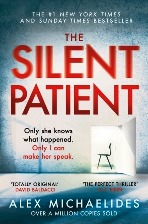
When we met at the
Groucho recently, Alex Michaelides was being self-effacing and thoughtful about
his massive success earlier this year with the hardback of his debut thriller, The Silent Patient.
In a genre accustomed to massively
successful debuts year on year (think, for example, of Paula Hawkins and, more
recently, Cara Hunter) The Silent Patient’s success has been superlative
– the paperback edition is to be published by Orion in
December with a number of big broadcast interviews to come.
The hardback was both a Sunday Times and New York
Times bestseller – going straight in at number one in the NYT (a first for a UK
debut) and remaining a top 10 NYT bestseller for
twenty seven weeks (another first for a
UK debut). It has been sold in 44
territories, yet another record for a UK debut. It has been named the bestselling debut in
the world for 2019. Brad Pitt’s
production company, Plan B, are in pre-production on the film adaptation with a
name director attached. (An announcement is imminent.)
The Silent Patient, if somehow it has passed you by, is the edgy story of Alicia Berenson,
a talented artist married to Gabriel, a celebrated fashion photographer. The apparently perfect marriage ends abruptly
when Gabriel is shot in the head several times and Alicia is accused of his
murder. She refuses to respond to the
accusation. In fact she refuses to speak
at all.
She is sent to a secure psychiatric
unit in North London where she is withdrawn and sometimes violent, her
continuing silence increasing her notoriety in the media and with the public at
large. Her silence fascinates forensic
psychotherapist Theo Faber. When he is
offered a job at her psychiatric unit he jumps at the chance to get her to open
up. Despite opposition from his
superiors he hatches a plan to get her to speak and reveal what happened the
night her husband was killed. Carrying
out this plan leads to a remarkably tense thriller with one of the truly great
twist-endings.
Alex, born in Cyprus to a
Greek-Cypriot father and an English mother, educated at Cambridge and the LA
American Film Institute, explains that the novel comes from both his interest
in Euripides play, Alcestis, and his experience working in a secure psychiatric
unit.
‘I became obsessed during my English degree
with the Greek myth of Alcestis. She
sacrificed herself for her husband but was eventually rescued from Death by
Hercules. In the celebrated play by Euripides, when Alcestis is brought back to life
she refuses to speak. Then I did a
post-graduate course in psychotherapy in London and through my sister, a
psychiatrist, worked part-time in this secure unit for teenagers. I didn’t think about writing a novel about it
at the time but I knew my experiences there were both formative and
life-changing. Then, much later, it
struck me that the world of psychotherapy would be the perfect modern setting
to re-imagine this story and explore its classic themes of death, guilt and
silence.’
Alex is open about the fact that he
was drawn to therapy, like his character Theo Faber. He studied both individual and group
therapy. He turned away from therapy
when he had reached the point when he was going to take on his own long-term
patients. Partly it was disillusionment
with some of the supposedly eminent therapists he came across. ‘They seemed to lack empathy and common
sense.’
His ambivalence about the
psychotherapy that had helped him so much plays into the novel. And it was his lifelong love of mysteries,
especially those of Agatha Christie, that ensured he would couch his
re-imagining as a thriller. ‘In
particular,’ he says, ‘I like reaching the end of a book and suddenly seeing
you’ve been looking at everything the wrong way round. Christie does it in a number of books but
particularly Death on The Nile. Henry James does it too, actually, in Portrait of A Lady when he shifts point
of view.’
In his previous screenwriting
career he worked with both Uma Thurman and Rosamund Pike amongst others. He
developed a good friendship with Uma Thurman which meant that when he was
writing The Silent Patient she was a good sounding board for him.
It was Thurman who suggested Alicia should
be an artist. ‘She taught me a lot about
writing. I had her advice in my head all
the time I was writing.’
And his experiences at screenwriting
school and writing scripts were invaluable for his novel writing. ‘Pace, movement all that,’ he says. He quotes Billy Wilder. ‘Any scene that doesn’t have a plot point in
it is a bad scene.’
He’s working hard on the Difficult
Second Novel. Expectations are
high. ‘It’s about a series of murders at
a Cambridge college. It’s pretty
gruesome.’ Like Greek tragedy then? He grins. ‘Absolutely.’
Peter Guttridge is the former crime fiction critic for the Observer. His 14th crime novel, The Lady of
The Lake, will be published at the end of November.
The Silent Patient published by Orion in paperback on 12th December, 2019 at
£7.99
